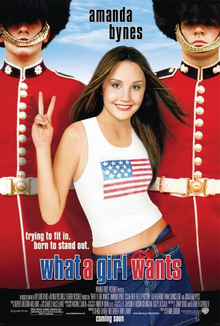Plot
Seventeen-year-old Daphne Reynolds lives with her wedding singer mother Libby above a restaurant in Chinatown, Manhattan. Many years earlier, Libby had met Briton Henry Dashwood in Morocco, and they had gotten married in a Bedouin wedding ceremony, under uncertain legality. They then returned to his family's estate in England.
Henry's father died soon afterward, making Henry the new Lord Dashwood, Earl of Wycombe. Libby eventually leaves Henry without telling him of her pregnancy, while Alistair Payne, the family's aristocratic advisor, tells Henry she had fallen in love with someone else.
Daphne runs off to London to try and meet her father, who has disclaimed his seat in the House of Lords to run for election to the House of Commons, hoping to eventually become the prime minister of the United Kingdom. With Alistair as his political advisor, he is engaged to Alistair's daughter, Glynnis, who hopes to become the new Countess of Wycombe.
At a London hostel, Daphne meets Ian Wallace, a local boy who works there to support himself so he can continue to pursue his dream of becoming a successful musician. After forming a friendship while Ian shows Daphne around London, they begin dating. When Henry catches Daphne at his estate, he is stunned to learn he has a daughter, but his mother Jocelyne, the current Countess of Wycombe, immediately welcomes her in, giving her a room at the estate.
Daphne tries to win the acceptance of her father's social circle, but is repeatedly thwarted by Glynnis and her daughter Clarissa, who feel threatened by her arrival. In addition, Daphne has to ward off the advances of Armistead Stewart whom Clarissa fancies and with whom Ian has a long-standing rivalry. After he attempts to hit on her, Daphne pushes Armistead into the River Thames.
Daphne inadvertently wins over the British aristocracy, including the elderly royal Princess Charlotte. However, Henry's political campaign suffers due to Daphne's flamboyant behavior and his subsequent misbehavior with her. He convinces Daphne to assume the more dignified manner of the Dashwood lineage, after which Henry's polling numbers quickly improve. However, Ian is hurt by Daphne's new behavior and eventually breaks up with her.
During her Debutante party, hosted by her father, Jocelyne invites Libby to attend, while Daphne overhears Alistair telling Glynnis how he "got rid" of her mother. When Daphne confronts him, Glynnis locks her in another room. Then she asks Ian, the band's lead singer, to announce the father–daughter dance.
Libby frees Daphne, but when they see Henry dancing with Clarissa, Daphne tells Henry she is returning to the United States. Sometime later, Henry announces that he is withdrawing from the election.
As Henry leaves the press conference, he discovers that Alistair knew about Libby's pregnancy and manipulated their separation. He punches him in the face for this deceit, then breaks off his engagement to Glynnis.
Henry reunites with Daphne and Libby at a wedding ceremony, telling Daphne that he loves her for who she is. They reconcile and engage in a father–daughter dance. Ian reunites with Daphne and Henry apologizes to Libby.
Later, Glynnis marries a wealthy nobleman and Clarissa marries Armistead while Alistair now works on a London tour bus. Henry and Libby legally marry in another Bedouin ceremony, while Daphne is accepted into the University of Oxford, now in a relationship with Ian.
